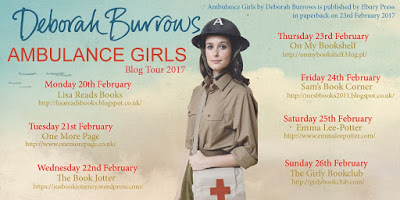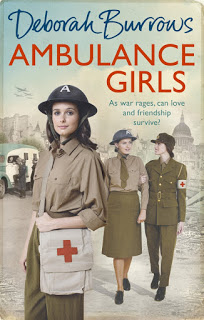I seem to be reading only historical novels lately, guys, but I also have this luck that the books are really great representatives of the genre. Today “The ambulance Girls” by Deborah Burrows blog tour stops with me and I have an extract for you – it’s just a foretaste, sounding so very promising and I am sure you’re going to enjoy the book whole – heartedly!
CHAPTER SIX
I woke to a cold morning. Damp white mist swirled around the gardens and the sun was like a great orange ball. It was nearly winter, I realised disconsolately. It would be my second winter in England, and I was not looking forward to it at all. It was the darkness that had affected me the most last year. I expected that I would find it as miserable this year also, with the added bonus of nightly air raids. I couldn’t help sighing. It was springtime in Perth now and my mother’s roses would be in full bloom in our small garden.
On the table in the lobby, next to the cubicle that housed the building’s telephone, were the letters that had been delivered for the occupants of St Andrew’s in yesterday’s second post. There were three letters for me, all from Australia. The flimsy aerograms were creased and a little grubby after their long journey. One was my mother’s weekly epistle. I recognised Uncle Charles’s scrawl on the second, and when I turned the third letter over, it was from a school friend. I was delighted at this tangible connection to home, but I sighed as I tucked the letters carefully into the pocket of my jacket; I would read them once I had breakfasted.
I had been away from Australia now for nearly three years, and I missed my family terribly. After so many letters, I knew what my mother’s would contain: she would tell me that my father and my brother Ben were well, give me a small anecdote about each, and then concentrate on her ‘war work’. Mum had formed a local Red Cross branch as soon as war was declared and now spent most of her time rolling bandages, packing parcels for Australian prisoners of war and helping to run funding drives for Blitz victims, in between knitting scarves and jumpers for servicemen. From her letters, it seemed my mother was the same tiny ball of energy as she had been when she waved goodbye to me at Fremantle Dock on that hot January morning in 1938.
My father hated writing letters, but I knew he would have scrawled a message of love at the bottom of my mother’s epistle, telling me that he missed me and longed to see my beautiful smiling face. He always wrote the same message, and it always made me cry. If I were lucky, my brother Ben, now fifteen and about as fond of letter writing as Dad was, would also have written me a short note.
I was well aware that my parents were desperate for me to return home, but they never pushed. Sometimes I wished I could leave London and sail back to Australia, but I knew the work I did in London was worthwhile and essential, and I had made up my mind not to leave until the war was over, no matter how many cold, dark winters I had to endure.
FOLLOW THE BLOG TOUR FOR MORE CONTENT:

